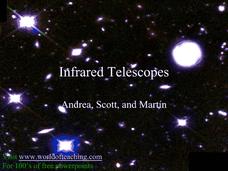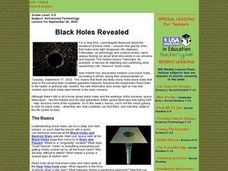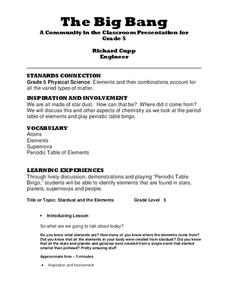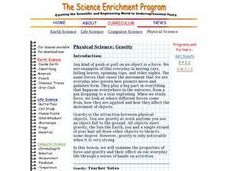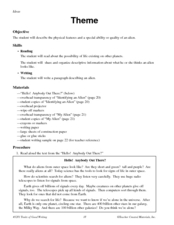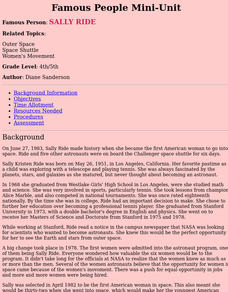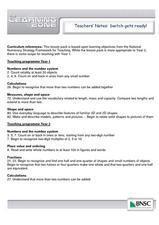Curated OER
Infrared Telescope
Most of the twenty slides in this presentation include photographs or diagrams, making it an eye-catching way to teach about infrared telescopes. The pros and cons of using infrared light to study outer regions of space are explained....
Curated OER
The Drake Equation
Students use the Drake Equation to calculate the probability of sustaining life on various planets. Through the use of the equation, they determine whether intelligent and advanced civilizations can be developed on planets other than...
Curated OER
The Sun
Middle schoolers draw diagram of sun and its layers, including photosphere, chromosphere, corona, convection and radiative zones, and core. Students then describe each layer in their own words, define sun spot cycle, and describe solar...
Curated OER
Black Holes Revealed
Students explore the concept of black holes through an interactive program. They explore how they form and what materials form them. They can also visit websites in which they can research radio transmission between the Earth and space.
Curated OER
The Energy of Empty Space
In this energy in empty space worksheet, high schoolers use an equation for Cosmic Inflation to solve eight problems. They find the domain and range of the function of the equation, they determinethe axis of symmetry, they find the...
Curated OER
The Big Bang
Fifth graders relate the elements in the human body to those produced during a supernova. In this space science and chemistry lesson, 5th graders listen to a lecture and view visuals about the big bang. They relate the production of...
Curated OER
WEAVING TECHNOLOGY INTO THEMATIC UNITS T.O.O.L.S. 2000
Third graders utilize computers and other technology to explain the solar system. Ten different stations involve students through laserdisc, research, art, GeoSafari, space toys, and the computer.
Curated OER
Time Intervals
For this time intervals worksheet, students solve 8 problems where they determine the time gamma-ray bursts last, the time black hole micro-flares are emitted, the time coronal mass ejections travel and the days between lunar phases of...
Curated OER
Space Science
Eighth graders study the objects in our solar system. In this space lesson students identify and describe planets, then classify them as terrestrial or gaseous.
Curated OER
STRAINING FOR SOUND
Sixth graders use a laser along with computer microphone probeware and the appropriate software, 6th graders determine the speed of rotating objects.An audio amplifier is connected to a solar cell to change the laser light signal into a...
Curated OER
Physical Science: Gravity
Learners investigate the properties of force and gravity and their effects on everyday life. In groups, they test various balls by bouncing them on different surfaces and observe the properties. In another activity, they test marbles and...
Curated OER
Working with Rates
In this working with rates learning exercise, students solve 9 problems where they find the rates, they solve 5 problems where they find the rates for compound units and they solve 5 problems where they find the rates using scientific...
Curated OER
Taking Risks: Drug and Alcohol Abuse
Students discuss a video about drug and alcohol abuse and their connection to risk-taking. They answer questions on a risk factor sheet about the use of tobacco, drugs, and alcohol. They discuss long and short term goals and how not...
Curated OER
The Planet Earth
Students explore the planet Earth, outer space, and Earth's axis. They demonstrate reading comprehension skills, including literal meaning, inference and critical analysis.
Curated OER
Exploring the Interstellar Medium
Students investigate the Interstellar Medium and the Local Bubble that the Sun is inside. They read and discuss a handout, answer discussion questions, observe a demonstration of light scattering, and conduct an experiment on the...
Curated OER
My Alien
Students listen to text read from "Hello! Anybody Out There?" and then brainstorm what aliens from outer space look like and do they exist at all.
They then will describe the physical features and a special ability or quality of an alien.
Curated OER
Theme
Students examine a reading selection. In this descriptive writing instructional activity, students read an excerpt from "Hello! Anybody Out There?". Students discuss the idea of aliens living on other planets, describe what they think an...
Curated OER
SALLY RIDE
Students express what it would be like to launch off into outer space in a space shuttle. They include what it might feel like, look like, sound like, and any thoughts that go through their mind as they dart away from the Earth's...
Curated OER
Teachers' Notes: Switch Gets Ready!
Students practice multiplication facts, answer simple math questions from two, five, and ten times-tables, explore concept of halves and quarters, complete worksheet containing range of shapes to make shape picture, and sort data and...
Curated OER
Hello, Anybody Out There?
Students understand that people believe there may be life in other solar systems. For this communication with other solar systems lesson, students analyze our planet and write things they want to communicate to other solar systems.
Curated OER
Gamma Ray Bursts
Students study an article on Gamma Rays. In this investigative lesson students study the energy and wavelengths of gamma rays and the theories behind them.
Curated OER
Periodic Table
Students identify the periodic table trends and predict material properties. They also design and conduct simple experiments and test material properties. Finally, students compare and contrast material properties and that chemical...
Curated OER
Pea Brain! Explorations in Estimation
Young scholars estimate how many peas fit in a container. In this science lesson, students calculate the weight of a pea and record it. They use this data to calculate how many peas fit in a human brain.
Curated OER
Astronomical Scales
Young scholars describe the different units of measurement. In this space science lesson, students calculate astronomical distances using a scale. They explain the significance of using scientific notation in expressing very small or...


